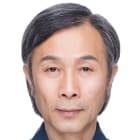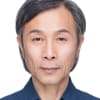commentary Commentary
Commentary: Why is former Chinese premier Wen Jiabao’s eulogy about his mother being censored?
Chinese censors may have deemed the Macau Herald article to be an unacceptable, scalding criticism of President Xi Jinping and his policies, but that view is unwarranted, says Professor Bo Zhiyue.
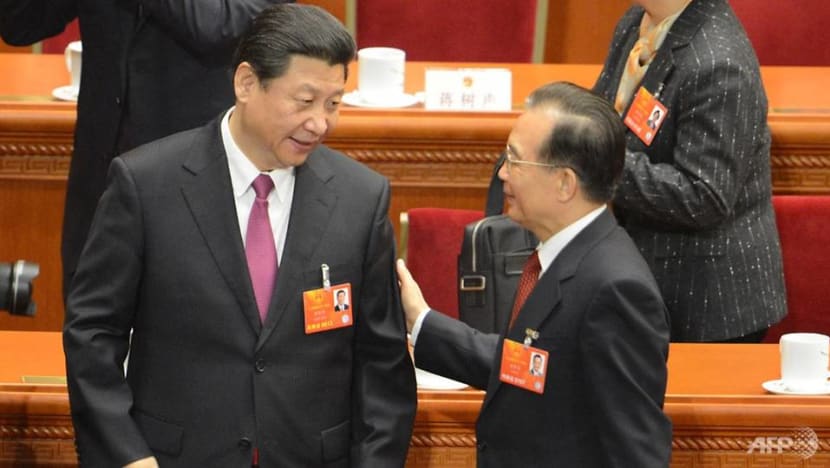
Chinese President Xi Jinping talks to former Chinese premier Wen Jiabao after the closing session of the National People's Congress (NPC) at the Great Hall of the People in Beijing on Mar 17, 2013. (Photo: AFP/Goh Chai Hin)
SHENZHEN: Who would have thought a eulogy penned by a former head of government could be cancelled?
Yet when Wen Jiabao, ex-premier of the People’s Republic of China from 2003 to 2013, published a four-part series reminiscing about his late mother, Yang Zhiyun, in a local Macau journal Macao Herald from Mar 25 to Apr 15, the unthinkable happened.
Sharing of the full article has been blocked on WeChat, the most popular Internet platform in China. Links to the tribute on Weibo returned an error message.
There has been no official acknowledgement that the post has been deliberately curbed, nor any specific explanation why Mr Wen’s article has been blocked, apart from pop-up messages citing violation of platform rules.
But there has been a lot of talk about what seemed like Mr Wen’s coded criticisms of Chinese President Xi Jinping and his policies.
READ: Commentary: China’s divide-and-conquer strategy isn’t fooling anyone anymore
RETIREMENT A NEW SENSITIVE WORD
Mr Wen’s very carefully worded article has not been well-received by Chinese censors for five possible reasons.
First, he mentioned “retirement” three times. He talked about his father’s retirement once but his own retirement twice.
“I retired,” he said, “after having worked in the Zhongnanhai for 28 years, including 10 years as Premier.”
The Constitution of the People’s Republic of China before its 2018 revision stipulated that a Premier could serve for two consecutive terms. Mr Wen followed the stipulation and retired. He referred to retirement as a good institution.
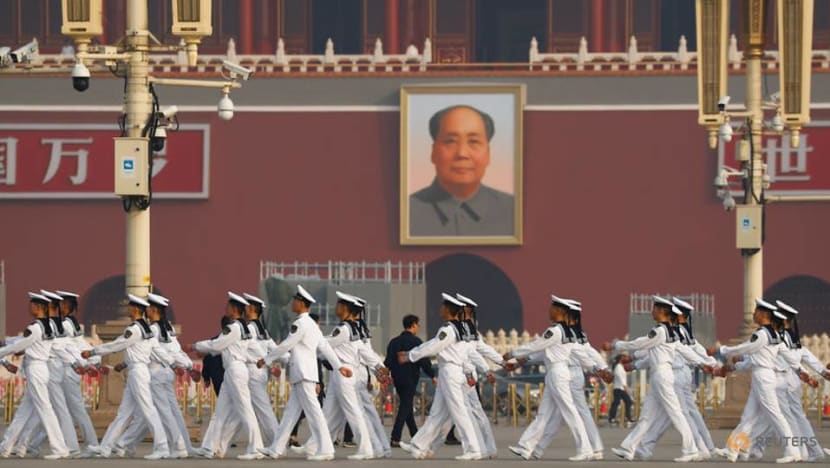
For Chinese censors, however, retirement is a sensitive term. Term limits on China’s presidency were recently lifted.
Focusing on political retirement seems to go against the grain of the expectation that President Xi might not retire anytime soon and is in fact likely to stay beyond two terms.
This word, “retirement,” combined with two related numbers, 10 years and two terms, has immense political implications for the upcoming 20th Party Congress in 2022, when President Xi would have stepped down and handed power over to a new leader.
READ: Commentary: Why China’s US$2.8 billion fine is a huge relief for Alibaba
COUNTRY, ANOTHER SENSITIVE WORD
Second, Mr Wen used the term “country” six times but not “party” even once, signalling that in his eyes, the country is more important than the Chinese Communist Party (CCP).
This takes on a different meaning when the term, party, has more frequently referred to the core of the CCP leadership.
When someone is described as being disloyal to the party, for instance, he or she is in fact regarded as being disloyal to the core leader of the CCP, President Xi.
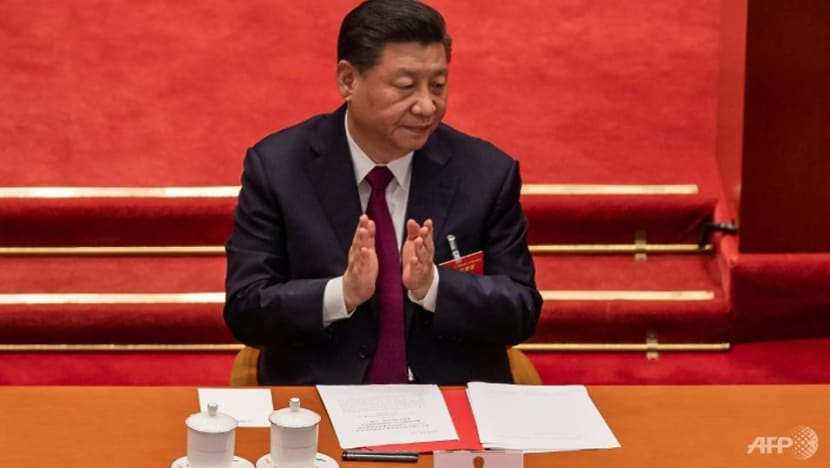
In deliberately omitting the word from his eulogies, Mr Wen’s article could have signalled he did not want to be seen as another personal loyalist of the core leader.
Worse, he elevated the ideals of virtue beyond personal loyalty in emphasising his patriotism to the People’s Republic of China and his love of the Chinese people.
POSITIVE REFRAMING OF THE CULTURAL REVOLUTION
Third, Mr Wen referred to the Cultural Revolution six times and expressed his deep resentment towards the political campaign initiated by Mao Zedong and executed by Mao’s wife and her followers.
He described the Cultural Revolution as a major disaster to his family who had to endure hardship to make an honest living.
His comments stand in sharp contrast to events over the past eight years. Under the new Chinese leadership, the legacy of the Cultural Revolution has been revised and reframed as a poignant moment in the CCP’s history worth commemorating.
READ: Commentary: China more focused on getting rich than it is in stoking US rivalry
New school textbooks, glossing over the unrest and upheaval, have sparked discussions over that controversial period in time.
Symbols of the Cultural Revolution have also been revived and couched in positive terms. Mao Zedong’s wife Jiang Qing’s tomb has been opened for public view.
Madame Mao’s pet operas The White-Haired Girl and the Red Detachment of Women, both lionising the suffering of the female peasantry, are staging performances again to celebrate the centenary of the CCP's founding in 2021.
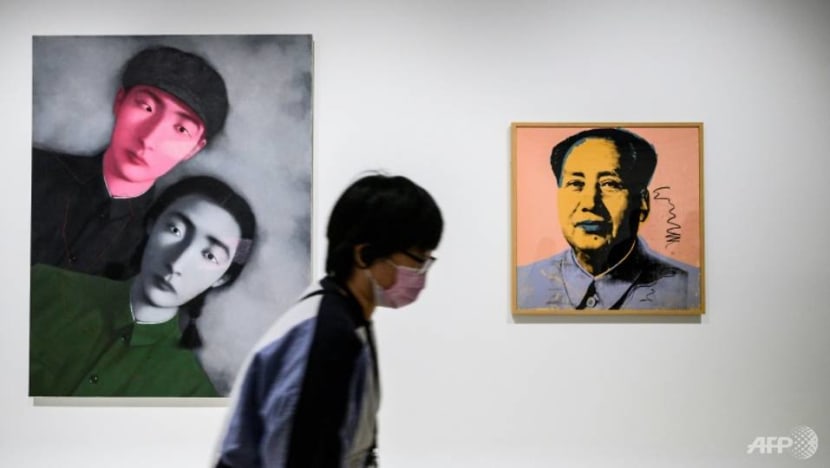
WEN JIABAO’S VISION PROBLEMATIC
Fourth, Mr Wen mentioned his vision of China. In his view, China should be a country full of justice and fairness.
It should be a country with “eternal respect for human hearts, human morality and humanity” and where there always is “an air of youth, freedom, and hard work”.
For this kind of country, Mr Wen wrote, “I cried over and fought for.”
The implication of Mr Wen’s words is that today’s China is not the same country and that few in power are selflessly fighting for these national goals.
READ: Commentary: China's boycott of H&M, Nike and other big brands is really bizarre
THE ALTERNATIVE LEADER
Fifth, it may be the censors’ understanding that current leader, President Xi, wants to be unconditionally supported as the unrivalled core of the Party.
They think he wants to be regarded as not only the most consequential leader of the CCP who has unconditional support from all in the past eight or nine years since the 18th National Party Congress when he assumed power but also over the past 40 years since China’s opening up and potentially since the CCP’s founding.
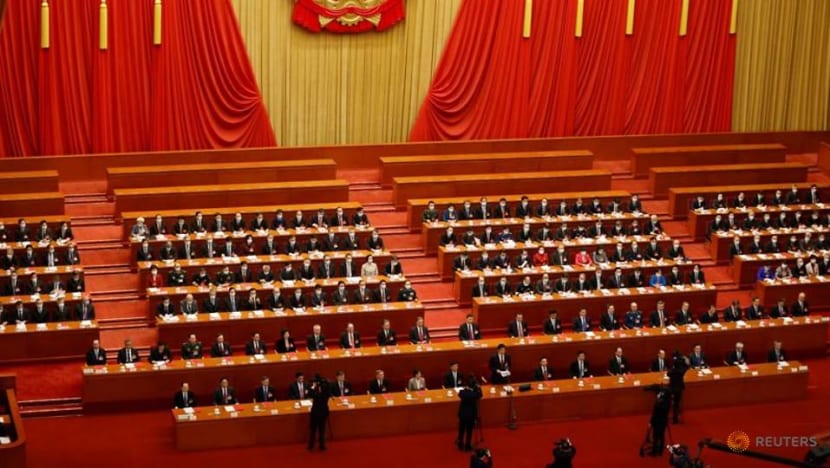
Mr Xi did manage to enshrine his ideological contribution into the CCP Constitution as “Xi Jinping Thought on Socialism with Chinese Characteristics for a New Era” in 2017, placing him on par with Mao.
That an opinion piece by a former premier with a good reputation has been censored remains the most startling fact.
Unfortunately for Mr Wen, his article has been regarded by the Chinese censors as a veiled criticism of President Xi and his policies and had to be managed, even though there are no indications that Mr Wen’s intention was to criticise Mr Xi.
His words read at face value also emphasise his lack of contact with the realities in China. “In the past eight years,” Mr Wen said in the article. “I seldom go outside and have often stayed with her (his mother).” His opinion piece was all about his mother and his family.
There are also no signs Mr Wen has ever intended to challenge President Xi’s leadership. On the contrary, it was Mr Wen, along with others, who supported Xi as the next leader of the Chinese Communist Party at the 18th National Party Congress in 2012.
READ: Commentary: China’s pineapple ban another prickle in relations with Taiwan
So while his article says nothing explicit about Mr Xi, his policies or the general direction China is heading towards under Mr Xi, the fact that Mr Wen mentioned his own retirement, the suffering of his own family during the Cultural Revolution, and his own vision for China has been regarded as an unequivocal challenge to authority.
His article cannot be allowed to be published on mainstream media in China. The circulation of his article must be blocked on WeChat.
This is a pity. Under Mr Wen’s leadership, China’s achieved high growth. It had just joined the World Trade Organization and was finding new economic opportunities. China had also hosted the Summer Olympics, a sort of coming out party for the country.
Hopefully, with the personal intervention of President Xi, who might look at things differently from the Chinese censors, Mr Wen’s touching article could be revived for Chinese netizens to reflect on.
Professor Bo Zhiyue is founder and president of the Bo Zhiyue China Institute, a consulting firm providing services to government leaders and CEOs of multinational corporations.








